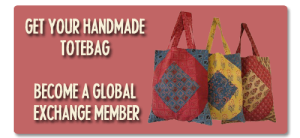 The following piece is part of our ‘Women Around the World Inspiring Change’ blog series that will run until Mother’s Day 2014.
The following piece is part of our ‘Women Around the World Inspiring Change’ blog series that will run until Mother’s Day 2014.
So far, we have featured a women’s group in Nogales, Mexico Hogar de Esperanza y Paz/Home of Hope and Peace (HEPAC), María Estela Barco Huerta, an incredible leader of DESMI (Desarrollo Económico Social de los Mexicanos Indígenas), and a partnership between the Fair Trade company, Equal Exchange, and women in the 10 primary societies of Gumutindo Coffee Co-op in Uganda.
Now, meet a mother behind the beautiful Fair Trade tote bags in Rajasthan, India.
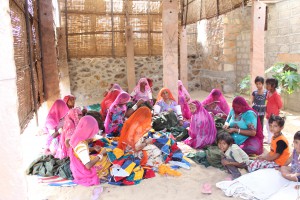
Sitting on the soft ground in a pile of kantha stitch quilts with a group of mother artisans, I met a strong and contented Kamala.
Kamala is part of a strong community of artisans in a small village near Barmer, Rajasthan that hand-makes our Global Exchange Eco-shopper membership bags.
As I mentioned in my first travel post, it is a tradition for men to block print, and women to quilt. The women’s workspace is a rectangular tent made by hand from woven leaves and branches that protect us from sun and captures any breeze that comes by.
I see women clad in fuchsia and neon orange saris, gold and gemstone earrings and nose rings, and stacks of plastic bangles. The colors of their clothing are so vibrant and creates a beautiful contrast to the desert all around.
I am invited to sit with the artisans. One woman starts talking to me, so I grab my guides Riya and Anjuli to translate. I understand the woman is asking how many children I have. “I have one boy, he’s 9.”
She follows-up by asking how many years I’ve been married. I tell Riya, my current translator, that I am not married. She looks at me and softly says, just tell her something. So she tells the woman I’ve been married for 5 years. The woman I’m speaking with seems satisfied and re-focuses on her stitching.
Next, I sit down next to a young woman with a beautiful smile covered by transparent neon orange fabric.
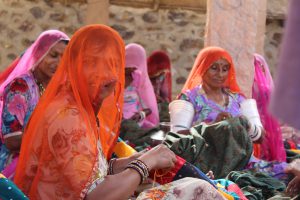 Some of the women are wearing white plastic bangles that start small at their elbow and increase in size up to their shoulder. I ask the woman in orange why isn’t she wearing them: “ Women are given these bangles when they are married. New laws say we are only required to wear them for 3 years after marriage, and I have been married for 12 years.”
Some of the women are wearing white plastic bangles that start small at their elbow and increase in size up to their shoulder. I ask the woman in orange why isn’t she wearing them: “ Women are given these bangles when they are married. New laws say we are only required to wear them for 3 years after marriage, and I have been married for 12 years.”
The woman I’ve been speaking to is Kamala Devi. She is 30 years old. She has been married for 12 years, and has 3 children, 1 boy and 2 girls. Kamala was born and raised in Chohtan, a small village just outside of Barmer. All of her children are in school, and she says she will teach her daughter the art of stitching- like her mother taught her – in addition to schooling.
I ask Kamala a few questions:
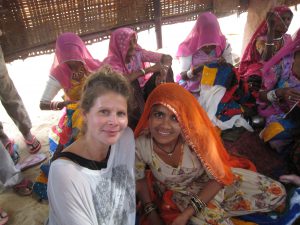 What do you love about being a mother? Being a mother is wonderful. I love my children and want them to finish school and go on to become good humans.
What do you love about being a mother? Being a mother is wonderful. I love my children and want them to finish school and go on to become good humans.
How did you meet your husband? She laughs, It was arranged by my mother.
Will you arrange your daughters’ wedding? “Yes.”
Who are your best friends? “The women I work with.”
What do you talk about? “We talk about family and our work.”
What do you do in your free time? Kamala laughs, “After I finish my house chores I come to work. I have no free time.”
What is your art form? “I work in appliqué stitching and metal. I have been working for 10 years.”
What is your favorite color? “Yellow.”
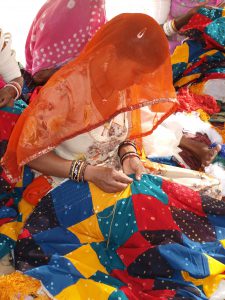 I look to my left and see that one artisan has pulled a bottle of bright blue nail polish from her blouse and is painting my friend Kelly’s nails. I look to my right and see that my friend Erin is trading her sunglasses for earrings and a sari. Before I leave, I give Kamala a hug. All the other women found this very funny, and want hugs too. When I said “Bye”, it was just too funny. As I walked back to the bus, I heard the women mimicking me…”Bye, Bye, Bye…”.
I look to my left and see that one artisan has pulled a bottle of bright blue nail polish from her blouse and is painting my friend Kelly’s nails. I look to my right and see that my friend Erin is trading her sunglasses for earrings and a sari. Before I leave, I give Kamala a hug. All the other women found this very funny, and want hugs too. When I said “Bye”, it was just too funny. As I walked back to the bus, I heard the women mimicking me…”Bye, Bye, Bye…”.
I was in Rajasthan for two weeks. I had three Indian women guides, who patiently answered my daily questions about the roles of women in India. What really was beautiful is that in a country that has a caste system, where marriages are arranged and village women have seemingly no choice, there is still a celebration of womanhood.
I saw happiness in the color of their dress, and in their smiles. There is immense strength in their community. I observed the respect that younger women showed for elder women. They bowed and touched the feet of their elders. The artisans I met had a strong eye contact, pride in their work, and joy as they speak. They all had voices, and are empowered by Fair Trade to determine the value of their work by creating the prices of their art.
I asked Kamala “Are you happy” she answered, “Yes”.
- Support our work which has a direct impact on Fair Trade artisans in India and around the world! And join the hundreds of people who carry around a stylish Handmade Expressions tote bag.
- Get a day-to-day account from Ray from One World Fair Trade who also participated in the trip.

